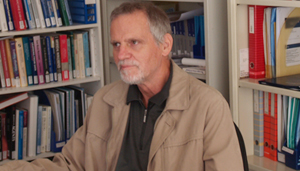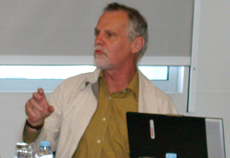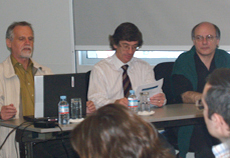S P E C I A L R E P O R T
Member from INESC Porto is the third Portuguese person to win the title of ECCAI “Fellow”
INESC Porto LA scores points in Artificial Intelligence 
Portugal was once again acknowledged in the area of Artificial Intelligence with Pavel Bernard Brazdil being awarded with the title of “Fellow” by the European Coordinating Committee for Artificial Intelligence (ECCAI). Pavel Brazdil is full professor at the Faculty of Economics from the University of Porto (FEP) and coordinator of LIAAD (Laboratory of Artificial Intelligence and Decision Support) INESC Porto LA. The researcher is extremely honoured since, according to the stipulated conditions, this acknowledgement «recognizes individuals who have made significant, sustained contributions to the field of Artificial Intelligence (AI) in Europe». So, according to Pavel Brazdil, this is the way to create better conditions for a larger Portuguese intervention as far as Artificial Intelligence at a European level is concerned.
Among the best in Europe
The bar is high since only 3% of the members of the 28 member societies from ECCAI can be awarded with the title of “Fellow”.
The researcher is clearly honoured for being the 3rd Portuguese person to win this title and he hopes that this number will increase in the future. In fact, he highlighted that this kind of acknowledgement is extremely important for a researcher, even though he didn’t see it as a professional goal. Instead, he prefers to place «interesting questions that make us move forward and promote research and progress».
According to Pavel Brazdil, ECCAI is an important European institution in the area of Artificial Intelligence that promotes cooperation between the different national associations as well as the exchange of ideas in its different subareas, thus consequently leading to new ideas and new developments.
 Award may strengthen Portugal’s role in European context Award may strengthen Portugal’s role in European context
More important than the prestige that this title entails for the researcher living in Portugal since 1982, and for the institutions that welcomed him (the University of Porto in particular), is the fact that this may be a landmark as far as the Portuguese intervention in the area of Artificial Intelligence is concerned in the European context.
Pavel Brazdil is one of the members of the Portuguese Association of Artificial Intelligence (APPIA), the society that represents Portugal in ECCAI, and he believes that this title is a platform that will promote a larger Portuguese intervention in this European entity.
Full Professor at the Faculty of Economics from the University of Porto (FEP), where he has been lecturing for almost three decades, and member of APPIA, where he was president for four years, Pavel Brazdil promoted the organisation of the first meeting in the area of Artificial Intelligence in Portugal (EPIA).
Pavel Brazdil, a life dedicated to Artificial Intelligence
Pavel Brazdil graduated in Electrical Engineering in the Czech Republic (his country of origin) in 1968. He started specialising in Artificial Intelligence while pursuing his doctoral studies in that same filed at the University of Edinburgh, one of the most acknowledged centres at the time other than the MIT and the University of Stanford, USA.
In 1988, the Group of Artificial Intelligence and Data Analysis (NIAAD) was established. After integrating INESC Porto’s Associated Laboratory, the group became known as LIAAD INESC Porto LA. «We have reasons to believe that the group was able to stand out as one of the most important, not only in Europe, but also at a global level», stated the researcher.
As far as R&D is concerned, the role of LIAAD INESC Porto LA’s director was marked by the publication of over 120 papers in specialised journals, book chapters or even international congress minutes, as well as by the publication of five books as co-author. The added value of the work developed by Pavel Brazdil is also related to the promotion of interdisciplinary activities between the sub-areas within Artificial Intelligence – Symbolic Learning and Data Mining – and other areas of knowledge, such as Management and Economics, with particular emphasis on how to enter costs (obtaining information, prediction errors), or on the adaptive modelling of the economic agents.
 Interview with Pavel Brazdil Interview with Pavel Brazdil
BIP – In your opinion, what role will Artificial Intelligence play over the next 20 years?
«The words "Artificial Intelligence" confuse many people. (…) I think that many areas may benefit from AI studies, such as economy and management.
However, I believe that AI may be useful in plenty other areas, such as health, bioinformatics and human language technologies, just to name a few examples.
Twenty or thirty years ago, the tendency was to separate the problem into smaller and treatable sub-problems (for instance, vision or language studies, or separate learning). This led to a certain fragmentation within the area. Today, we are going in the opposite direction. We intend to gather the parcel theories, so that we can increasingly explain the surrounding world and handle the problems that need a solution. Progress in this area clearly needs a good theoretical development.»
|



 Award may strengthen Portugal’s role in European context
Award may strengthen Portugal’s role in European context
 Interview with Pavel Brazdil
Interview with Pavel Brazdil